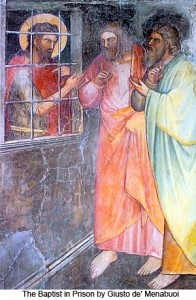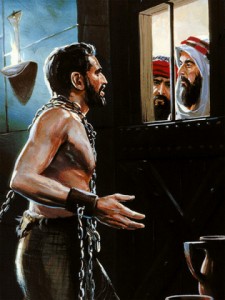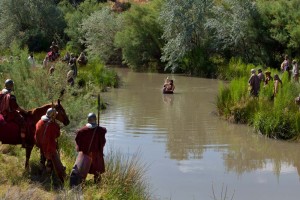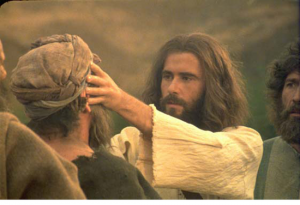
In Luke 7:19-28, John the Baptist was in prison and sent two of his disciples to Galilee to ask Jesus a question.
And John, calling to him two of his disciples, sent them to the Lord, saying, Are you he who is to come, or shall we look for another?” And when the men had come to him, they said, “John the Baptist has sent us to you, saying, ‘Are you he who is to come, or shall we look for another?’
Some say John was doubting. Was Jesus really the one sent from God, the Messiah, or not?

Human weakness could possibly be an explanation though John the Baptist does not strike me as one who is going to doubt Jesus as the Messiah considering all that he had witnessed and known.
I think a better explanation might be that John the Baptist had to decrease and Jesus had to increase (John 3:30). What is the best way to get your disciples to leave you and follow the Messiah than to send them to Jesus to ask him if he is the Messiah?
In other words I don’t think it was doubt that caused John to send his disciples to ask Jesus that question. It was that he wanted to wean them off of himself so that they would realize who Jesus really was and begin to follow him.
Luke continues,
In that hour [Jesus] cured many of diseases and plagues and evil spirits, and on many that were blind he bestowed sight. And he answered them, “Go and tell John what you have seen and heard: the blind receive their sight, the lame walk, lepers are cleansed, and the deaf hear, the dead are raised up, the poor have good news preached to them. And blessed is he who takes no offense at me.” (Luke 7:18-28)
Seeing Jesus’ miracles and their correspondence side-by-side with the prophecies of Isaiah certainly gave the proof to an honest heart and mind.

This seems to me an adequate and substantial explanation of John the Baptist’s question. I think St. Francis de Sales explained it this way and if anyone knows where the citation is, please let me know.
“The glorious St. John the Baptist did not send his disciples to Jesus our Lord to find out whether or not He was the Messiah. He had three reasons: first, to make Him known to the whole world. Second, he wanted to draw disciples only to his Teacher, to whose school he now sends them to be instructed personally by Him. Third, to detach them from himself and let them see Jesus so that they might come to Him in a manner worthy of Him. Therefore, John sent them to this Divine Majesty.”




This Post Has 7 Comments
Thanks for your very well thought out and studied answer.It has been a great help.God bless you
You may be thinking of St. Francis de Sales’ Sermon for the Third Sunday of Advent (December 13, 1620) wherein he focused extensively on the humility of John the Baptist. I don’t think he addressed his possible “doubt” while in prison though in that particular homily.
Actually, St. Francis de Sales does discuss your point in his Sermon for the Second Sunday of Advent on December 6, 1620.
Hi Steve,
This is a series of quotes put together from the book: “Sermons of St. Francis for Advent and Christmas” located on pages 5 and 6. Thanks for inspiring me to discover this treasure of wisdom!
You do have a lot of the Early Fathers and Thomas Aquinas for example, denying John the Baptist had any doubts. This, I think, was born of a fear that doubt tantamounted to disbelief and therefore a sin. Not necessarily so. I think no one has greater weight on the matter than successors of Peter, and in the last three popes what you have is a clear allusion to the Baptist’s doubts, born out of human weakness, and in light of Jesus compassionate ministry which baffled those awaiting a fiery Messiah. In the O.T., we have prophecies concerning both the aspects in the one Messiah, they just had a hard time grappling with the first; Jesus’ compassion and mercy to ALL people. Here are some excerpts of what I found from our last three pontiffs.
Pope Francis on doubts about vocation: Even St. John the Baptist had dark times
In his homily at Mass in Casa Santa Marta, the pope spoke about the doubts that may arise even despite a very strong vocation. He used the example of John the Baptist, who went through “dark times” meaning his doubts about the faith.
“This is the greatness of John, a great one, the last of that group of believers that began with Abraham, one who preaches conversion, one who does not beat around the bush to condemn the proud, one who at the end of his life allows himself to doubt.”
The pope said that doubts are not a sign of weakness, but rather something “beautiful” that can happen to “those who are certain of their vocation.”
EXCERPTS FROM THE PAPAL HOMILY
(Radio Vaticana)
“He preached forcefully, he said some ugly things to the Pharisees, to the doctors of the law, to the priests, he didn’t say to them: “But dear friends, behave yourselves!” No. He said to them simply: “You race of vipers! He didn’t use nuance. Because they approached in order to inspect him and to see him, but never with open hearts: “Race of vipers! He risked his life, yes, but he was faithful. Then to Herod, to his face, he said, “Adulterer! It is not licit for you to live this way, adulterer!” To his face! But it is certain that if a pastor today said in the Sunday homily, “Among you there are some who are a race of vipers, and there are many adulterers,” certainly the Bishop would receive disconcerting letters: “But send away this pastor who insults us.” And he insulted them. Why? Because he was faithful to his vocation and to the truth.”
“The great can afford to doubt, and this is beautiful. They are certain of their vocation but each time the Lord makes them see a new street of the journey, they enter into doubt, “but this is not orthodox, this is heretical, this is not the Messiah I expected.” The devil does this work, and some friend also helps, no? This is the greatness of John, a great one, the last of that band of believers that began with Abraham, that one that preaches conversion, that one that does not use half-words to condemn the proud, that one that at the end of his life is allowed to doubt. And this is a good program of Christian life.”
“Let us ask from John the grace of apostolic courage to always say things with truth, from pastoral love, to receive the people with the little that they can give, the first step. God will do the rest. And also the grace of doubting. Often times, maybe at the end of life, one can ask, “But is all that I believed true or are they fantasies?” the temptation against the faith, against the Lord. May the great John, who is the least in the kingdom of Heaven, and for this reason is great, help us along this path in the footsteps of the Lord.”
Pope Benedict XVI
Joseph Ratzinger in his Advent profile of the John the Baptist [“The Meaning of Advent” in Dogma and Preaching
“Challenging and active, he stands before us, a type of the masculine mission in life. He is the stern herald who summons the people to metanoia: to a change of heart or conversion. Anyone who wants to be a Christian must be constantly changing his thinking or outlook.’ By nature, we are inclined to be always asserting ourselves, repaying in kind, making ourselves the enter of attention. If we want to find God, we must be constantly undergoing an interior conversion, turning around and moving in the opposite direction, , and this even in the way we understand life as a whole.
“Day in and day out, we are confronted with the world of visible things. So strongly and insistently does it impinge on us through billboards, the radio, commerce, and every incident of daily life that we are tempted to think nothing else exists. Bit in fact the invisible is greater and more valuable than all visible reality. According to a marvelous saying of Pascal, a single soul is worth more than the entire visible universe. But if we are to grasp this truth in a vivid way, we must be converted; we must, as it were, do an interior about-face, overcome the the spell that visible reality casts over us, and acquire a sensitive touch, ear, and eye for the invisible. We must treat the invisible as more important than all the things that thrust themselves upon us with such force day after day. ‘Be converted:’ change your thinking, your outlook, so that you perceive God’s presence in the world; change your thinking so that God may become present in you and, through you, in the world.
“John himself was not spared this difficult process of changing his mind-set, of having to convert, of undergoing what de Lubac calls ‘the alchemy of being.’ It already begins with his having to proclaim, as one crying in the wilderness, a man whom he himself does not know. Is it not the fate of the priest and of every Christian who proclaims Christ that we, too, know him and yet do not know him, that we, too, despite the darkness of our ignorance, must bear witness to him whom unfortunately we still know, and will always know, only too imperfectly”
Let us interject how Scripture gives witness to John’s knowing, but, at the same time, not knowing Christ. John doubted on the brink of martyrdom. While in prison, he sent messengers to Christ asking: “Are you he who is to come, or shall we look for another” [Lk. 7, 9]? He answered by referring to the same testimony with which He had had begun His teaching at Nazareth: “Go and tell John what it is that you have seen and heard: the blind receive their sight, the lame walk, lepers are cleansed, and the deaf hear, the dead are raised up, the poor have good news preached to them. And blessed is he who takes no offense at me” [Lk. 7, 22-23]
Ratzinger then remarks: “John’s real suffering, the real recasting as it were of his entire being in relation to God, began in earnest with the activity of Christ during the time when he, John, was in prison. The darkness of the prison cell was not the most fearful darkness John had to endure. The true darkness was what Martin Buber has called ‘the eclipse of God:’ the abrupt uncertainty John experienced regarding his own mission and the identity of the one whose way he had sought to prepare.
In words of burning power John had prophesied the coming of the judge and had painted in fiery colors the great day of the Lord. He had portrayed the Messiah as the judge with the winnowing fan in his hand that would separate the chaff from the grain and throw the chaff once and for all into eternal fire. He had portrayed him as one who would cast out this adulterous generation and, if need be, raise up children of Abraham from the very stones to replace the faithless people who called themselves the children of Abraham. Above all, amid the fearful ambivalence of this world where we are constantly waiting and hoping in darkness, John had expected and proclaimed a clear message: that the day would finally come when the hopeless darkness would be dispelled in which human beings wander to and fro and know not where they are going. The ambiguity would disappear, and men would no longer have to grope their way in the endless mist but would know for certain that this and no other is God’s unequivocal claim on them, that this and no other is their situation in relation to God.
“Meanwhile at God’s command, John’s prophetic finger was pointing out a man, ‘Behold the Lamb of God, who takes away the sin of the world!’ [Jn. 1, 29]. God’s presence had begun… but what a difference from what John had imagined! No fire fell from heaven to consume sinners and bear definitive witness to the just; in fact, nothing changed at all in the present world. Jesus went about preaching and doing good in the land, but the ambiguity remained. Human life continued to be a dark mystery to which people had to entrust themselves with faith and hope amid the world’s darkness.
“Clearly, it was this utterly different personality of Jesus that most tormented John during the long nights in prison: The eclipse of God continued, and the imperturbable advance of a history that was so often a slap in the face to believers. In his distress John sent messengers to the Lord: “Are you he who is to come, or shall we look for another?” [Mt. 11, 31]. It is a question all of us were ready to ask during the nighttime bombings of the Second World Ware, and are inclined to ask over and over again in all the distresses of our own lives, “Are you really he: the Redeemer of the world? Are you really here now as the Redeemer” Was that really all that God had to say to us?”
“In answer, Jesus reminds John’s messengers of what the prophet Isaiah had said in foretelling precisely this kind of peaceful, merciful Messiah who will not cry or lift up his voice, or make it heard in the street [Is. 42, 2], but will go about preaching and doing good. Jesus adds the significant words: ‘Blessed is he who takes no offense at me.’ This means that it is in fact possible for men to take offense at him. Even when he comes he does not bring such absolute clarity to the human situation as to eliminate all questions and solve all riddles; people can take offense at him, but Blessed is he who takes no offense.’ Blessed is he who ceases to ask for signs and absolute certainty. Blessed is he who is able, even in this darkness, to go his way in faith and love.
“This was probably the final task set the Baptist as he lay in prison: to become blessed by this unquestioning acceptance of God’s obscure will; to reach the point of asking no further for external, visible, unequivocal clarity, but, instead, of discovering God precisely in the darkness of this world and of his own life, and thus becoming profoundly blessed. In point of fact, we cannot see God as we see an apple tree or a neon sign, that is, in a purely external way that requires no interior commitment. We can see him only by becoming Iike him, by reaching the level of reality on which God exists; in other words, by being liberated from what is anti-divine: the quest for pleasure, enjoyment, possessions, gain, or, in a word, from ourselves. In the final analysis it is usually the self that stands between us and God. We can see God only if we turn around, stop looking for him as we might look for street signs and dollar bills, and begin looking away from the visible to the invisible.
“John, then, even in his prison cell had to respond once again and anew to his own call for metanoia or a change of mentality, in order that the might recognize his God in the night in which all thins earthly exist. ‘Blessed is he who takes no offense at me.
“No other way of reaching an understanding with God can be shown to the Christian of today, either: he must stop looking for external clarity and begin to turn from the visible to the invisible and, thus, truly find the Lord who is the real foundation and support of our existence. When we do so, another and doubtless the greatest saying of the Baptist acquires its full significance: ‘He must increase, but I must decrease’ (Jn. 3, 30). We will know God to the extent that we are set free from ourselves. This beings us back to the main theme of Advent: We will now God to the extent that we give him room to be present in us. A person can spend his life seeking God in vain if he does not allow God to continue in his life the presence begun” [J. Ratzinger, “The Meaning of Advent,” Dogma and Preaching, Ignatius (20011) 322-326.
Francis continues: “The Church must hear the Word of Jesus and raise her voice, proclaim it boldly. ‘That’ – he said – ‘is the Church without ideologies, without a life of its own: the Church which is the mysterium lunae which has light from her Bridegroom and diminish herself so that He may grow.’
“This is the model that John offers us today, for us and for the Church. A Church that is always at the service of the Word. A Church that never takes anything for herself. Today in prayer we asked for the grace of joy, we asked the Lord to cheer this Church in her service to the Word, to be the voice of this Word, preach this Word. We ask for the grace, the dignity of John, with no ideas of their own, without a Gospel taken as property, only one Church that indicates the Word, and this even to martyrdom. So be it! ”
Saint John Paul II – ECUMENICAL MEETING WITH ROME’S LUTHERAN COMMUNITY – 11 Dec, 1983
“…The eternal Word of God became flesh and made his dwelling among us (cf. Jn 1:14). In this memorable hour of the Third Sunday of Advent, with you I wish to witness this one Lord and Redeemer of ours who is here yesterday, today and forever. We recall with gratitude our common origin, the gift of our redemption and common goal of our itinerary as pilgrims. We are all under the grace of our Lord Jesus Christ. He is the centre and the cornerstone in whom all existence, the meaning and salvation of this world and of our lives are contained.
During this Advent time of salvation, our ears and our hearts are tense: they hear and perceive the good news of the one who has already come and who will return definitively. We experience often in our daily lives the anguishing truth of this transitory period. Do we not continually recall the situation of John the Baptist? As the Gospel tells us, he found himself in a decisive situation. He had to resolve the contradiction between the image that had been formed of the Messiah and his personal situation, determined by prison and the threat of death. John’s question was therefore serious, and was born from an emergency situation: “Are you ‘He who is to come’ or do we look for another?” (Mt 11:3).
Jesus reaches out to meet the anguished question of his precursor and brings his faith to certainty: the time of salvation, the kingdom of God has come. The Messiah is here. Without doubt the signs and wonders do not have a compelling nature. But whoever is able to understand the signs as an indication of the fulfilment of the Old Testament prophecies at the current moment can rejoice at being a citizen of God’s eschatological kingdom.”
It isn’t that John the Baptist was questioning his own faith. John knew very well who Jesus was. He knew that Jesus was the anointed one sent from God. It was that his disciples did not know. So John sent them to Jesus and probably said, “See what He does. Listen to what He says. Then, you will know.”
The following is a excerpt from a longer reflection inspired by an article I read during my consulting days: “The Neuroscience of Leadership” by Rock and Swartz. It supports the view you express.
In Matthew 11, we read that John the Baptist is in prison. Some think that, at that point, John is unsure
that Jesus is the Messiah. This is highly unlikely as John knew from his conception who Jesus is. We read in Luke’s Gospel that John leaped in his mother’s womb when Mary visited Elizabeth with the baby Jesus in utero. (LK 1:44) In the first chapter of John’s Gospel, John the Baptist refers to Jesus as the “Lamb of God who takes away the sins of the world.” (JN 1:29) Later in the same chapter the Baptist testifies, “This is the Son of God.” (JN 1:34)
Rather than expressing doubt, I propose that John is beginning to transition his followers over to Jesus.
John could simply play the Sergeant and tell them who Jesus is, and said something like, ‘I don’t have
long to live. Stop following me and go follow Jesus.’ That might have worked for the short term, but it is
highly likely that, when some action(s) of Jesus did not conform to their expectations of the Messiah, the old-covenant-neural-pathways would take over and they would abandon Jesus in search of a warrior Messiah. John must have been wrong!
So, when John the Baptist gets word of the healing works Jesus is performing, he seizes the opportunity to cultivate a moment of insight. John knows that his followers know the scriptures about the promised Messiah. John has engrained those neuro-pathways into their brains. So instead of telling them that Jesus is the Messiah, he sends them to ask Jesus a question: “Are you ‘He who is to come’ or are we to look for another?” (MT 11:3) In so doing, John sets the stage for Jesus to deliver the aha moment.
Jesus could have responded that indeed he is the Messiah but He did not. Rather, knowing they were
schooled in the scriptures about the Messiah, Jesus cultivates a moment of insight. He refers to the
prophet Isaiah and says, “Go and tell John what you hear and see: the blind regain their sight, the lame
walk, lepers are cleansed, the deaf hear, the dead are raised, and the poor have the good news
proclaimed to them.” (MT11:4-5)
Being God, Jesus understands that established neural pathways make change difficult. He tells us so in
Luke chapter 5 when he says that, “After drinking old wine, nobody wants new.” (LK 5:30) Jesus, as we
learn at the wedding feast at Cana, is the new wine, and He is preaching a new way. Those that have
drunk deeply of the old way, the scribes and Pharisees in particular, do not want to drink the new wine.
They need the aha moments.
Comments are closed.